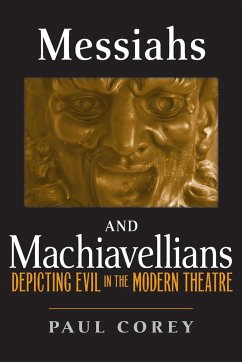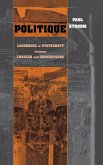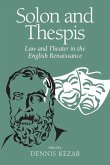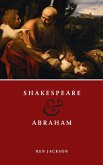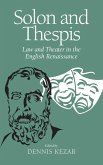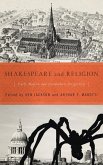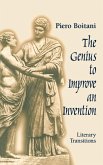Messiahs and Machiavellians is an innovative exploration of "modern evil"in works of early- and late-modern theatre, raising issues about ethics, politics, religion, and aesthetics that speak to our present condition. Paul Corey examines how theatre-which expressed a key political dynamic both in the Renaissance and the twentieth century-lays open the impulses that instigated modernity and, ultimately, unparalleled levels of violence and destruction. Starting with Albert Camus' Caligula and Samuel Beckett's Waiting for Godot, then turning to Machiavelli's Mandragola and Shakespeare's Measure for Measure, Corey traces the emergence of two dominant, intertwining features of modern evil: an unrestrained pursuit of power and the utopian desire for perfection. Corey's imaginative and convincing readings of these plays, based on detailed textual analysis, move beyond the accounts usually offered by literary critics. Drawing on political, theological, and philosophical sources-a combination as fertile as it is unusual-Corey's methodology allows him to make keen and subtle arguments about the eschatological nature of modern politics. "Corey's lucid, compelling treatise argues for a radical reconsideration of the role of tragedy in dealing with the shifting metaphysical and metatheatrical sands of the contemporary era. While the study begins with an examination of mid-20th Century French existentialism-and the dramatic work of Beckett and Camus in particular-the book soon takes the reader on a fascinating voyage back into the 'problem' comedies of the Italian and English Renaissance theatre, and beyond that, into Greek tragedy to understand the evolving concept of 'evil' in the Western philosophical, theological, and dramatic tradition. Ending with a reflection on the new 'theatre' of terrorism entering the 21st Century, Corey poses the intriguing suggestion, that far from being irrelevant to the post-modern era, a 'new tragic sensibility' may become key to our gaining a 'lucid awareness of our current situation [.... ] the limits of politics, the indelible nature of violence, our inescapable mortality, and a need for prudence.'"-Moira Day, University of Saskatchewan "A sensitive examination of the problem of evil in Renaissance and 20th century drama. Corey provides fascinating analyses of individual plays, and makes a compelling argument for restoring a tragic vision of good and evil in the face of modern expediency and utopianism."-Mary P. Nichols, Baylor University "In Messiahs and Machiavellians, Paul Corey delivers insights both numerous and profound. His work is a serious and important contribution to contemporary political science while also offering analyses of interest to scholars in literature, religious studies, theology, and ethics."-Barry Cooper, University of Calgary
Hinweis: Dieser Artikel kann nur an eine deutsche Lieferadresse ausgeliefert werden.
Hinweis: Dieser Artikel kann nur an eine deutsche Lieferadresse ausgeliefert werden.

